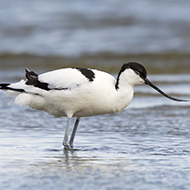Conservationists welcome new protections for seabirds

The Teesmouth and Cleveland Coast is home to species such as the pied avocet.
Conservationists have welcomed plans announced by the government to help protect England’s rare and vulnerable seabirds, including new and extended special protection areas and a comprehensive Seabird Conservation Strategy.
Martin Harper, director of global conservation at the Royal Society for the Protection of Birds (RSPB), hailed the announcement as a ‘first step’ in tackling the growing problem of species decline.
“Many seabirds are declining at an alarming rate, both globally and across the UK,” he said. “We welcome today’s announcement by the government to reverse these deadlines through a comprehensive Seabird Conservation Strategy.”
The plans were announced by environment minister Rebeca Pow earlier this month following an evidence-based assessment carried out by Natural England. They include new and extended special protection areas (SPA) designed to protected seabirds from human activity, such as outdoor recreation or fishing, and will be designated in the Solent and near Middlesborough.
Some 1,000 pairs of three species of tern will benefit from the Solent SPA, which will span an area equivalent to 125,000 football pitches. The Solent area is the fifth most important foraging site in the UK for little tern and the seventh most important for common tern during the breeding season.
The Teesmouth and Cleveland Coast SPA will be extended by 109 km2 to an area the equivalent of more than 17,000 football pitches. With this extension in place, more than 25,000 birds, such as pied avocet, ruff and migratory red knot, will receive greater protection.
“The UK continues to be a world leader in cutting carbon emissions and pushing for greater protections for marine life around our coast and in the global ocean,” commented Rebecca Pow. “As the devastating impacts of climate change are only too visible, it is vital that we take decisive steps now that make a real difference to help protect our wildlife and allow vulnerable species to recover.
“We have already protected important nesting sites for seabirds, such as the little tern, and these new and additional protections to their feeding grounds, together with the development of a new strategy to protect our seabirds, will help the coastal environment recover, develop and, importantly, thrive.”
The environment minister has also confirmed a comprehensive Seabird Conservation Strategy, which will be published in December 2020. This will assess the vulnerability of each species in light of the pressures they face and propose actions to address them.
Martin Harper added: “It will be a first step in tackling this growing problem and is something that the RSPB has been calling for. We look forward to working with the UK Government to make sure that these islands remain globally important for seabirds.”



 The RCVS has announced a new version of its 1CPD mobile app, with enhanced features for veterinary surgeons and veterinary nurses to record their continuing professional development.
The RCVS has announced a new version of its 1CPD mobile app, with enhanced features for veterinary surgeons and veterinary nurses to record their continuing professional development.